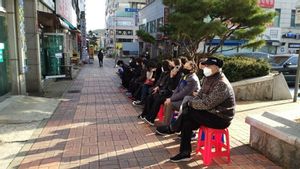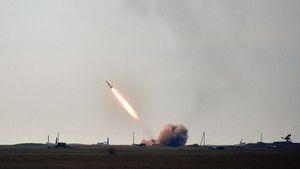JAKARTA - The strike of work, planned by nearly 30,000 nurses and other medical workers this week, is expected to exacerbate the medical crisis in North Korea as hospitals across the country have struggled with labor shortages due to a prolonged strike by doctors.
According to the Korean Health and Medical Workers Union, more than 91 percent of its members voted in favor of the strike that began next Thursday.
They demanded a salary increase and normalization of hospital operations, which have been disrupted by a seven-month collective strike by an intern, reported The Korea Times, August 26.
Most of the 29,705 workers who are members of the union, especially nurses, are expected to take part in strikes at 61 medical institutions across the country, including the University of Korea's National Medical Center and Medical Center.
Since more than 10,000 interns left their hospitals in February to protest the government's decision regarding the addition of a quota for medical school registration, many nurses have stepped in as assistant doctors to maintain essential medical services.
The union said its members who work in essential services, such as emergency care, would not participate in the strike. Nonetheless, their strike is likely to cause confusion and additional disruptions to hospitals, which are already struggling with staff shortages and financial difficulties.
The union said many of its members were exhausted after months of struggling to keep the country's medical system running without the presence of interns.
"Medic workers are exhausted by skipping meals, covering abuse, and have little time to rest in the bathroom while trying to fill the role of a junior doctor as an assistant doctor," the union said in a statement.
"The doctor's job should no longer be charged to nurses who have not been systematically trained for the responsibility," he continued.
The union added that many nurses were forced to work as assistant doctors after only a few days of training, which caused constant fear that they would make serious mistakes.
The union has urged hospitals to seek solutions to overcome labor shortages and approve a 6.4 percent increase in wages for non-doctoral medical personnel.
However, most hospitals do not have the financial ability to hire additional doctors or provide an increase in salaries, as their capacity is reduced to treating patients.
The strike of the young doctors dealt a severe blow to their finances, as hospitals relied on cheap workers from the doctors under the guise of training.
SEE ALSO:
After Sunday's emergency meeting, Health Minister Cho Kyoo-hong urged unions to withdraw their strike plans.
"The hard work, dedication and sacrifice of medical personnel have maintained our medical system despite challenges such as a strike by an intern and an increase in the number of COVID-19 patients. I would like to thank everyone for their work," said Minister Cho.
"If they continue their strike plan, the hospital operations will be disrupted and will ultimately harm the community. I urge this problem to be resolved by deliberation with entrepreneurs, not by collective action such as a strike," he said.
The English, Chinese, Japanese, Arabic, and French versions are automatically generated by the AI. So there may still be inaccuracies in translating, please always see Indonesian as our main language. (system supported by DigitalSiber.id)


















